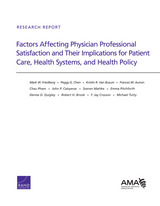
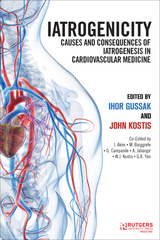
Edited by two renowned cardiology experts, Iatrogenicity: Causes and Consequences of Iatrogenesis in Cardiovascular Medicine addresses both the iatrogenicity that arises with cardiovascular interventions, as well as non-cardiovascular interventions that result in adverse consequences on the cardiovascular system. The book aims to achieve three things: to summarize the available information on this topic in a single high-yield volume; to highlight the human and financial cost of iatrogenesis; and to describe and propose potential interventions to ameliorate the effects of iatrogenesis. This accessible book is a practical reference for any practicing physician who sees patients with cardiovascular issues. .
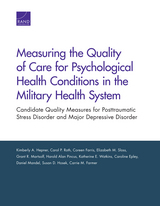
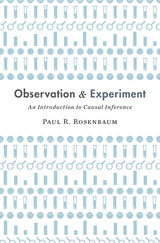
A daily glass of wine prolongs life—yet alcohol can cause life-threatening cancer. Some say raising the minimum wage will decrease inequality while others say it increases unemployment. Scientists once confidently claimed that hormone replacement therapy reduced the risk of heart disease but now they equally confidently claim it raises that risk. What should we make of this endless barrage of conflicting claims?
Observation and Experiment is an introduction to causal inference by one of the field’s leading scholars. An award-winning professor at Wharton, Paul Rosenbaum explains key concepts and methods through lively examples that make abstract principles accessible. He draws his examples from clinical medicine, economics, public health, epidemiology, clinical psychology, and psychiatry to explain how randomized control trials are conceived and designed, how they differ from observational studies, and what techniques are available to mitigate their bias.
“Carefully and precisely written…reflecting superb statistical understanding, all communicated with the skill of a master teacher.”
—Stephen M. Stigler, author of The Seven Pillars of Statistical Wisdom
“An excellent introduction…Well-written and thoughtful…from one of causal inference’s noted experts.”
—Journal of the American Statistical Association
“Rosenbaum is a gifted expositor…an outstanding introduction to the topic for anyone who is interested in understanding the basic ideas and approaches to causal inference.”
—Psychometrika
“A very valuable contribution…Highly recommended.”
—International Statistical Review
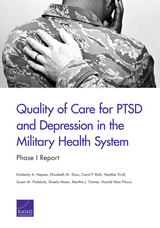

Although chemotherapy harms the immune system and is increasingly demonstrated to be an ineffective long-term cure for the vast majority of cancers, it remains the standard treatment for most cancer patients. Ruzic, a former scientific magazine publisher and originator of a science center, refused to accept this status quo, and instead plunged into the world of cutting-edge treatments, exploring the frontiers of cancer science with revolutionary results.
Ruzic went on the offensive: visiting scores of laboratories, gathering information, talking to researchers, and effectively becoming his own patient-care advocate. This book presents his findings. A scathing critique of the chemotherapy culture as well as unscientific "alternative" therapies, the book endorses state-of-the-art molecularly based technologies, making it an illuminating and necessary read for anyone interested in cancer research, especially patients and their families and physicians.
Neil Ruzic was expected to die within two years of his initial diagnosis. Five years later he has been declared cancer-free and considers himself cured.
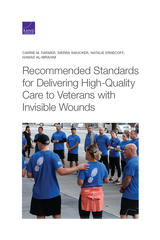
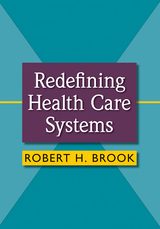
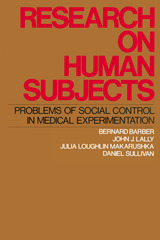
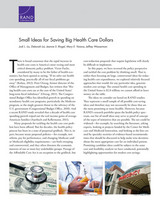
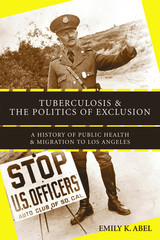
Winner of the 2008 Arthur J. Viseltear Prize from the American Public Health Association and Nominated for the 2008 William H. Welch Medal, AAHM
Though notorious for its polluted air today, the city of Los Angeles once touted itself as a health resort. After the arrival of the transcontinental railroad in 1876, publicists launched a campaign to portray the city as the promised land, circulating countless stories of miraculous cures for the sick and debilitated. As more and more migrants poured in, however, a gap emerged between the city’s glittering image and its dark reality.
Emily K. Abel shows how the association of the disease with “tramps” during the 1880s and 1890s and Dust Bowl refugees during the 1930s provoked exclusionary measures against both groups. In addition, public health officials sought not only to restrict the entry of Mexicans (the majority of immigrants) during the 1920s but also to expel them during the 1930s.
Abel’s revealing account provides a critical lens through which to view both the contemporary debate about immigration and the U.S. response to the emergent global tuberculosis epidemic.
READERS
Browse our collection.
PUBLISHERS
See BiblioVault's publisher services.
STUDENT SERVICES
Files for college accessibility offices.
UChicago Accessibility Resources
home | accessibility | search | about | contact us
BiblioVault ® 2001 - 2024
The University of Chicago Press









